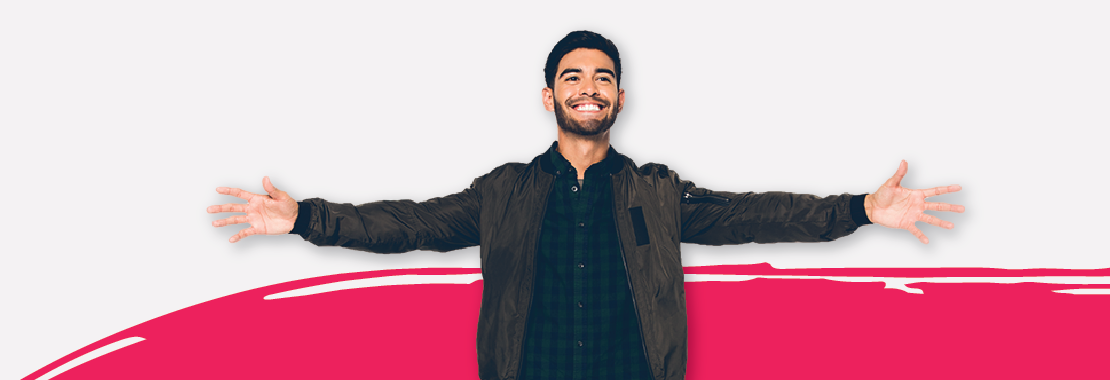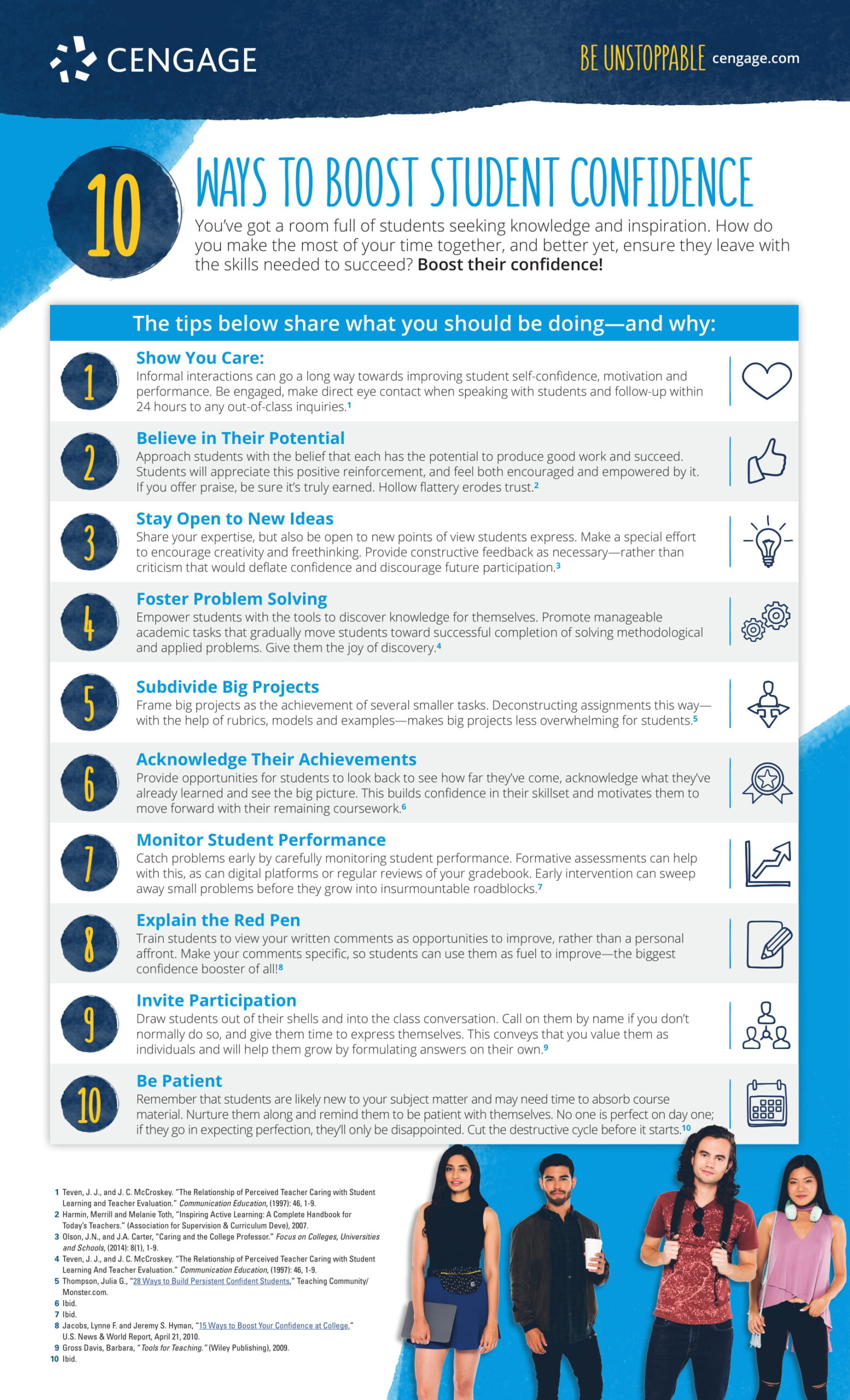Article Summary
- Confident students are better able to perform under pressure.|Resilience, rooted in confidence, allows students to rebound from tough situations and get back on track.|Students that are confident are more willing to take risks and step out of their comfort zones.
- field_5cf83622ba22e
A test, a presentation, a job interview. Each of us has experienced moments in which performing well was critical to achieving our goals. For these events, we prepare. We rehearse. We run through the material backwards and forwards. But ultimately, we must perform.
These events often start as expected: there are questions or tasks we complete easily. The hard part is still to come, we remind ourselves. But before we even get there, we’re blindsided.
Pressure builds. Doubt creeps in. Skills we’ve spent months honing start to feel shaky. Memory falters. But then, we relax. We realize we’ve been here before. We push forward. Things may not go exactly as planned, but we get the job done.
For this, we have confidence to thank.
Confidence Matters—in Learning and in Life
The relationship between confidence and performance is something most of us inherently understand. But the evidence is more than anecdotal: research reveals the more confident you feel, the better you perform.
In a University of Iowa study, two groups of college students were given a test. To boost their confidence, Group 1 was told that the test was designed for high school students. Meanwhile, students in Group 2 were told that the test was designed for Ivy League students, which lowered their confidence. Group 1 outperformed Group 2 by almost 9 points.
Confident learners are successful learners, and successful learners are more likely to go on to become successful people. But how does confidence impact a student’s ability to learn? Can we pinpoint the positive behaviors of confident students that lead to better outcomes? After talking with instructors and other experts across higher education, we’ve identified three key ways in which confidence positions students for success—in college and in life.
Confident Students Are Better Able to Perform Under Pressure
Confidence can help students come through in the clutch. And it’s not just a matter of becoming a better test-taker. Papers, projects and assignments all come with due dates, and with deadlines come pressure to perform. Students may know the material, but unless they feel confident in their knowledge and skills, they may not perform to their potential in those make-or-break moments that play a major role in determining success.
Confidence—or lack of confidence—plays a large part in determining a student’s mindset when he or she walks into a test or class,” says Dr. Carolyn Williams, an instructor at Shelton State Community College.
Although confidence alone may not be enough to help students perform under pressure, it is critical in propelling students toward success.
The idea is supported by research. Hendrie Weisinger and J. P. Pawliw-Fry, authors of Performing Under Pressure: The Science of Doing Your Best When It Matters Most, write: “Over a thirty-year period, research consistently found that people with a great deal of confidence see high-pressure situations—when they are tested—as challenges to be overcome, as opposed to crises to be confronted. In so doing, they find themselves immunized to a great degree against the deleterious effects of pressure and are better able to perform at a high level even when the pressure is intense.”
Learning to perform well under pressure benefits students long after they leave the classroom. In the workplace, confidence will give them an edge in the face of high-pressure projects, meetings or decisions.
Confident Students Are Better Able to Respond to Setbacks
Academic success depends in part on how students perform in high-pressure situations, but for the most part, it depends on their day-in, day-out track record. And over the course of a semester, students are bound to face challenges.
Missed deadlines. Poor scores on homework. Lack of engagement. Any of these things can throw a student off kilter. And most students experience at least one of these each semester; some may go through them multiple times. Outcomes depend on how the student responds.
The notion that resilience in the face of setbacks contributes to student success is nothing new. Studies show that resilience has a positive influence on academic performance of undergraduates.
Angela Duckworth has famously written about the importance of “grit” as a determinant of student success. But where does grit come from?
The answer, according to some educators, is confidence.
Dr. Kathleen Hughes Stellmach, professor of psychology at Pasco-Hernando State College certainly thinks so. She says, “For students, resilience is partly rooted in a sense of self-efficacy. If they believe that they can do something, they will be more likely to develop grit—and tap into it when they need it.”
Confident Students Are More Likely to Take Risks and Step Outside Their Comfort Zone
One of the central roles of higher education is to present students with new experiences. And indeed, when asked about drivers of student success, a number of educators cite a student’s ability to take risks. One reason why: for students, leaving familiar territory to try new things can broaden their perspective, enhance their skills and uncover strengths or interests they weren’t aware of.
Stepping out of [students’] comfort zone is part of learning. If they aren’t challenging themselves, they aren’t really learning. — Dr. Emily Beard-Bohn, Associate Professor English, Saginaw Valley State University
Cornel Plebani, Department Chair of Criminal Justice at Eastern Maine Community College, suggested that the responsibility of instructors to encourage exploration. “Good educators force discomfort in and outside the classroom to promote exposure to new ideas and personal/academic growth,” he said.
But the benefits of taking chances go beyond perspective. They also include improved performance.
A 1908 study by Robert M. Yerkes and John D. Dodson revealed that arousal—characterized by the anxiety often brought on by challenges—can increase performance levels, but only to a point. When that point is exceeded, performance decreases.
By learning to be comfortable while being uncomfortable, students can better cope with the stress that comes when they venture into unfamiliar territory. So does confidence make a student more likely to tread new ground?
“Truly confident students will be more apt to step outside of their comfort zone–they usually have a quest for learning that lets them apply what they know while learning additional, new, material,” says Nancy Abisher, professor at the College of Central Florida.
“Confidence does help students step out of their comfort zone. There is a power in vulnerability that comes, in part, from discovering that we all experience some challenges but that it is possible to overcome them,” says Diane Carter, senior instructor at the University of Idaho.
Confidence isn’t the only factor that helps students become risk takers. Many educators cited the presence of a learning environment that promotes experimentation and views mistakes as part of the learning process as being critical to making students more likely to try new things – and to be more successful while doing so.
Counting on Confidence
When it comes to learning, there’s no substitute for developing knowledge and skills or proper preparation. But a greater sense of confidence can help students maximize their potential – and get the most out of their college experience.
Higher education today faces many challenges, with better preparing students for success in the workforce ranking chief among them. Helping students build and sustain confidence – and finding ways to instill a sense of self-efficacy in students to whom it does not come naturally – presents one of our greatest opportunities for helping more students achieve their academic goals and setting them up for success, not just in the workforce but in life.
Check out our 10 tips for helping build student confidence in your classroom.



